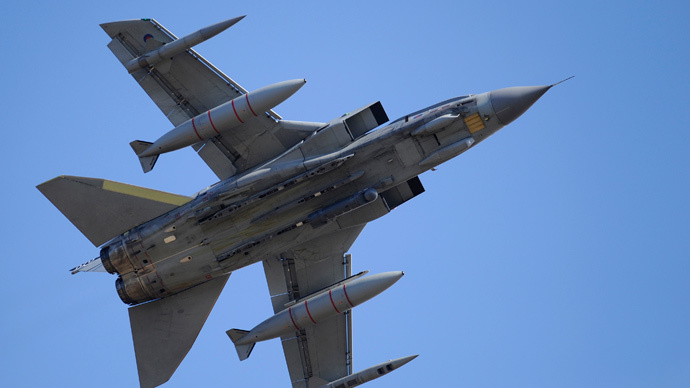Will Cameron push for another vote to bomb Syria?

In the wake of the Tunisian massacre, in which up to 30 British nationals died, questions have been raised as to whether Prime Minister David Cameron will try to secure parliamentary approval to extend airstrikes from Iraq into Syria.
Addressing MPs on Monday, Cameron gave the strongest indication yet that he feels Britain’s strategy for confronting Islamic State (formerly ISIS/ISIL) should be reframed to include airstrikes on Syria.
“We do need to crush [Islamic State] in Iraq and Syria,” he said, making it clear that in his view “military solutions” were needed.
Since parliament approved bombing raids in September 2014, the Royal Air Force (RAF) has flown more than 300 bombing raids against IS targets in Iraq.
READ MORE: Cameron vows ‘full spectrum’ British response to ISIS Tunisia shooting
The RAF is not authorized to operate over Syria, however, following the embarrassing defeat of a government motion to do so in August 2013.
Cameron may chance a second vote on the matter, as his original proposal was to strike against the regime of President Bashar al-Assad, not ISIS militants.
The motion hinged on intelligence claims that the Syrian regime has used chemical weapons on civilians. Its rejection by a narrow margin hinted strongly at an ingrained mistrust of intelligence sources which has colored public debate since the Iraq war.
Cameron saw the move blocked by a majority of just 13 votes after he had extensively lobbied UK allies, including the United States, to commit force.
There are no shortage of commentators – US, British and Iraqi among them – who say the anti-IS coalition’s strategy is failing.
It is the perception of failure, rather than the horrors of Tunisia, which some argue is informing Cameron’s renewed push for war.
Speaking to RT, Stop the War Coalition convener Lindsey German said: “David Cameron is trying to increase involvement of British troops in the Middle East.”
“He may use the revulsion at what happened in Tunisia last week to attempt once again to force a vote on bombing in Syria, this time of ISIS.”
Whatever his motivations, Cameron faces a number of obstacles if he wishes to extend the war to Syria – obstacles which he has himself acknowledge.
Minutes after the 2013 vote, Cameron said: “It is very clear tonight that while the House has not passed a motion it is clear to me that the British Parliament, reflecting the views of the British people, does not want to see British military action.”
“I get that, and the government will act accordingly.”
READ MORE: Revealed: Extent of British anti-ISIS airstrikes
Another obstacle is his pledge to then-Labour leader Ed Miliband that he would not use the royal prerogative to commit Britain to war without another vote in parliament.
“I can give that assurance,” Cameron told Miliband when pressed.
“Let me say the House has not voted for either motion tonight,” he told Miliband, while maintaining that he “strongly believed in the need for a tough response to the use of chemical weapons.”
Downing Street confirmed again on Monday that, unless a specific threat materialized, another vote would be required to attack Syria.
US President Barack Obama has reportedly urged Cameron in private to help the US hit IS command and control facilities in Syria.
Stop the War’s Lindsey German, however, maintains that even if Cameron was to fight for and win such a ballot, British warplanes over Syria would do nothing to further British counter-terror goals.
“We should remember that ISIS is the product of war, particularly the failed occupation of Iraq, and that the war on terror has failed in its stated aim. It has increased the threat of terrorism,” she said.












